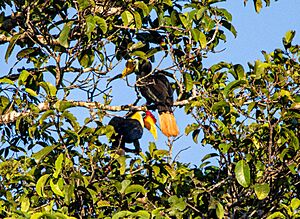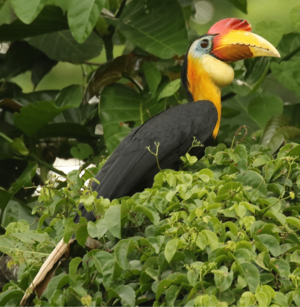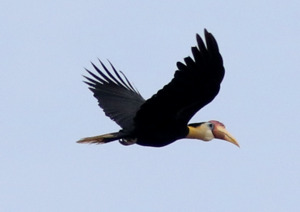Wrinkled hornbill facts for kids
Quick facts for kids Wrinkled hornbill |
|
|---|---|
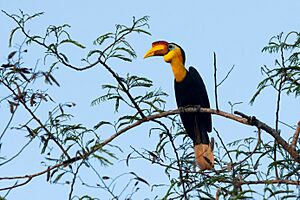 |
|
| Conservation status | |
| Scientific classification | |
| Genus: |
Rhabdotorrhinus
|
| Species: |
corrugatus
|
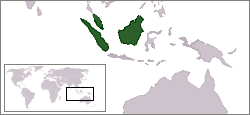 |
|
| Wrinkled hornbill range | |
| Synonyms | |
|
Rhyticeros corrugatus |
|
The Wrinkled Hornbill or Sunda Wrinkled Hornbill (Rhabdotorrhinus corrugatus) is a cool, medium-sized bird. It's known for its huge, colorful beak! You can find these birds living in the forests of the Thai-Malay Peninsula, Sumatra, and Borneo.
Contents
What Does a Wrinkled Hornbill Look Like?
These hornbills are about 70 centimeters (27 inches) long. They have mostly black feathers. A special feature is their very large beak, which is actually part of their skull. They also have a blue ring around their eyes. Their tail is usually white or has a reddish-brown tip.
Male vs. Female Hornbills
Male and female Wrinkled Hornbills look different, especially on their heads and beaks.
- Males have bright yellow feathers on their cheeks, throat, and chest. Their beak is yellow with a red base.
- Females have black feathers in these same areas, but their throat is blue. Their beak is almost entirely yellow.
What Do Wrinkled Hornbills Eat?
Wrinkled Hornbills are forest birds. They mostly eat fruit, especially figs. But they also enjoy small animals like frogs and insects. These birds don't drink water. Instead, they get all the water they need from the food they eat! Their call sounds like a harsh "Kak-kak" or a deep "Row-wow." You can hear their calls from far away.
Wrinkled Hornbill Life Cycle
Wrinkled Hornbills are special because they are monogamous. This means they stay with the same partner for their whole lives.
Nesting Habits
- They build their nests inside holes found in large trees.
- Once the female is inside the nest, she seals the entrance. She uses mud and her own droppings to plaster it shut.
- This leaves only a tiny slit, too small for her or the chicks to get out.
- The male hornbill is responsible for feeding his family. He brings them food by regurgitating it (bringing it back up) through the small opening.
- After several months, when the chicks are ready, the female breaks out of the nest.
Conservation Status
The first Wrinkled Hornbills were raised in captivity (meaning in zoos or special centers) in 1988. Sadly, these birds are now in danger. A lot of their forest home is being cut down. Because of this, the Wrinkled Hornbill was listed as an endangered species in 2018 by the IUCN Red List. This means they need our help to survive!



